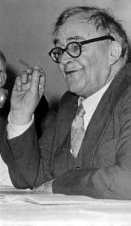Every year again I use to read two or three classic Christmas sermons. John Donne’s Nativity sermons are among my favorites, for example. This year however, I decided to take up the volume with ‘Predigten’, held by Karl Barth in the  prison (Strafanstalt) of Basel. This fact is surely important. From 1947 until 1954 Barth’s preaching activities were interrupted. But in 1954 he started preaching again more regularly. However, he restricted himself almost completely to the prison of Basel as his pulpit. These sermons have become famous because of their pastoral nature. The sermon for Christmas Day 1954, about Luke 2,10-11, offers abundant testimony to this quality.
prison (Strafanstalt) of Basel. This fact is surely important. From 1947 until 1954 Barth’s preaching activities were interrupted. But in 1954 he started preaching again more regularly. However, he restricted himself almost completely to the prison of Basel as his pulpit. These sermons have become famous because of their pastoral nature. The sermon for Christmas Day 1954, about Luke 2,10-11, offers abundant testimony to this quality.
After a short, direct prayer Barth sets off: ‘My dear brothers and sisters!’ (‘Meine lieben Brüder und Schwestern’). This is a sermon on its own, in which he embraces those prisoners. ‘Now we have heard the Christmas story’, he says. ‘And how did we hear it?’ Barth specifies a few options. Some of us, he says, might have missed it, because they were distracted. Others will have heard it like a nice fairytale, which they deeply question. Yet others will have had cherished childhood memories, a wonderful Christmas sentiment which will never return. ‘I just want to say, dear friends’, Barth continues, ‘this is what we make of Christmas. All of us’.
Until the angel of the Lord arrives… ‘The angel surely has gone through the streets and squares of Basel. He was there for those, who are lonely and sad or those who celebrated Christmas Eve perhaps too joyous and stupid. He is there for those, who are asleep now… And he will visit the churches from Basel this morning…’.
Barth’s pastoral introduction stands out. It might strike you as being at odds with his emphasis on the vertical dimension of the Gospel (‘senkrecht von oben’). In this sermon, however, Barth very consciously introduces his message in relation to the experience of his hearers. This does not mean that the vertical dimension is absent. On the contrary, Barth emphasizes it quite literally, refering to a picture that he had seen recently, on which the angel comes down like a thunderbolt. This is the truth about his message, Barth says, it really strikes us. There can be no doubt, that the Gospel comes to us from God and from Him alone.

In the remainder of his sermon, Karl Barth highlights three moments of his text. To start with he emphasizes the ‘to you’ (Euch) from the angel’s words: ‘For to you is born this day in the city of David a Saviour, who is Christ the Lord’. It is this ‘to you’ that makes the message of the angel different from other messages. In the latter case we could think: it is not my business. But the angel says: ‘for you’. Barth doesn’t shun a bit of selfmockery. ‘The angel of the Lord was not a professor, as I am. A professor would perhaps have said: To the people the Saviour is born. That is spoken in general. It makes one think: it is not about me, but about others.’
Then Barth underscores the words: ‘this day’ (Heute). That does mean that we are not talking about a remote past event, Barth says. It means we are living in the present, in a new day, God’s day. We need to hear it, in order that we take courage!
Lastly, he marks the word ‘Saviour’ (Heiland). It is the core of the Christmas story. ‘The Saviour is the One who brings us salvation, who rescues us, who liberates us. He is the One who brings salvation to all! He makes no exceptions, because we are all in need of his salvation and because He is the Son of God, who is the Father of all of us. As He became man, He became our Brother!’ Here we see that the way Barth adressed his hearers in the beginning of the sermon was no coincidence!
In the closing part of the sermon Barth returns to the different experiences he evoked in the introduction. Do we stick to the distractions, our questions or nostalgic memories? Or do we really notice, get up and convert? ‘The angel of the Lord does not compel anyone – says Barth – and I really am unable to do so. A compulsive hearing and a forced participation in this history, that is our history, would be nothing. It is about a free obedience and a free participation in this history’.
‘Euch ist heute der Heiland geboren’ (Lukas 2,10-11, Weihnacht 1954, Strafanstalt Basel), Karl Barth Gesamtausgabe vol.12, reihe I. Predigten 1954-1967, Herausgegeben von Hinrich Stoevesandt, p.9-17.
